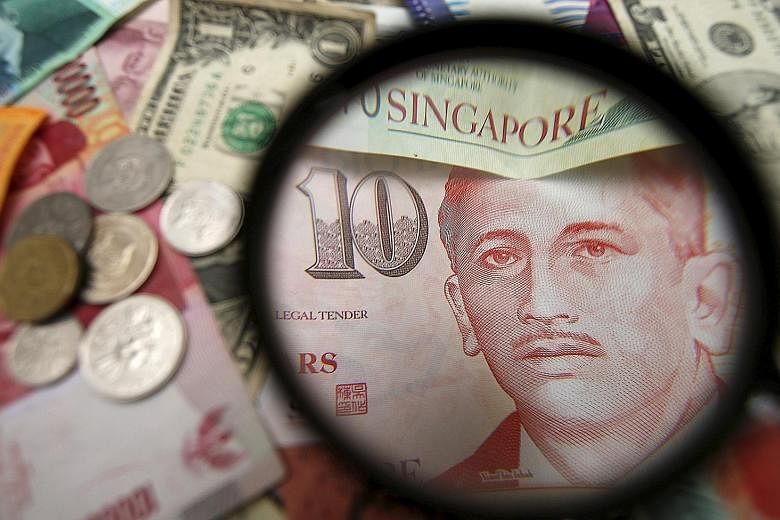It must be a tad disconcerting for savers to find out that Singapore interest rates may be sliding again after inching up nicely in recent months.
The rise is despite the surprise move two weeks ago by the Monetary Authority of Singapore (MAS) to stop the appreciation of the Singapore dollar against a basket of currencies it is pegged to.
Market pundits had anticipated that the MAS action should push up the costs of borrowing, such as the three-month Singapore interbank offered rates (Sibor), if only to persuade international investors to continue to hang on to their Singdollars.
Instead, the three-month Sibor has slipped to 1 per cent - its lowest level in eight months. Yet, just two months ago, it had stood at 1.25 per cent. And the Singdollar remains strong, despite not having a higher interest rate to prop it up. Less than one week after dropping over 1 per cent on the MAS move, it has more than reversed all of its losses.
The Singdollar's unexpected response to what economists describe as the MAS weapon of choice when Singapore falls into a recession highlights the dilemma policymakers around the world are facing in dealing with falling demand and stagnating growth.

For savers here, the scant consolation, if any, is that interest rates are still in positive territory.
The same cannot be said for about one-quarter of the world's economy covering wealthy countries such as Japan and the euro zone bloc of nations, where negative interest rates now rule the day.
Policymakers in those countries believe resorting to such unorthodox measures will incentivise banks to lend out the money now sitting idle on their cash balance, by charging them an interest for keeping it with the central bank.
If only life were so simple. Despite all the unorthodox steps launched by central bankers to pump more liquidity into the system, companies still face huge hurdles in getting the life-nourishing credit lines from their reticent bankers to sustain, let alone expand, their business.
Just ask casino operator Genting Singapore, which is hanging on tightly to its cash.
At its annual general meeting last week, the company's management got rapped by an angry shareholder for sitting on an enormous pile of cash - $5.1 billion to be precise - while still making a coupon payment of $117.88 million last year on perpetual bonds worth $2.3 billion.
Is the firm being too prudent? Surely, it would make better sense to use the cash to repay the bond issue, if only to save on interest costs, which worked out to almost as much as the $120.85 million doled out in dividends, the shareholder argued.
But alluding to the difficulties which even huge companies may have in getting access to credit, Genting Singapore executive chairman Lim Kok Thay said the company was lucky to sell the perpetuals when it did four years ago because the "market is now closed".
Perpetuals are bond-like instruments offering their holders a fixed payout but no voting rights. For companies, the big attraction is that perpetuals have no maturity dates and repayment of the principal is left at the issuer's discretion.
This is unlike straight bonds, in which both the principal and interest must be paid according to a fixed schedule.
Genting Singapore president Tan Hee Teck added that while the firm's borrowing costs can be as low as 1.2 per cent on the loans it takes up to build its projects because it is an investment-grade company, the catch is that banks may be willing to fund only up to half of the project's costs. The firm would still have to look to its own resources to finance the rest.
What they said sums up the daunting task faced by companies in this tough business environment to get bank credit - a task made all the more difficult for smaller firms that do not have as bankable a name as Genting Singapore.
Yet, it is the plight of the poor saver who has been getting whiplashed by the paltry payout on his bank deposit - because interest rates have been deliberately low for so long - that may turn out to be the bigger problem in the long run.
In his recent annual letter to shareholders, Mr Larry Fink, chairman of the world's biggest money manager BlackRock, singled out the growing trend of negative interest rates as a "particularly worrying" development.
He noted that the actions of central banks "attempting to spark economic growth" are "severely punishing the world's savers and creating incentives to reach for yield, pushing investors into less liquid asset classes and increased levels of risks, with potentially dangerous financial and economic consequences".
Mr Fink argues that low or negative interest rates are not only ineffective but are also actually counterproductive to the central banks' stated goal of stimulating the economy. Worse, they end up punishing savers while encouraging them to take extreme risks to try to earn a decent return.
He said: "Not nearly enough attention has been paid to the toll which these low rates and now negative rates are taking on the ability of investors to save and plan for the future."
Mr Fink noted that a 35-year-old looking to generate $48,000 a year in retirement income beginning at age 65 would need to invest $178,000 in a 5 per cent interest-rate environment. But that sum rises to $563,000 in a 2 per cent interest-rate environment.
And that, said Mr Fink, had profound implications for economic growth: Consumers saving for retirement need to reduce spending if they are going to reach their retirement income goals, while retirees - who have to contend with lower income - will have to cut their consumption as well.
Hence, low interest rates - a monetary policy that is supposed to spark economic growth - may actually end up fuelling deflationary pressure, the very thing it is trying to cure, by reducing consumer spending.
What should be done?
Mr Fink noted that the easy money policies implemented to heal the ills of the global financial crisis eight years ago were supposed to be temporary, "but I don't call seven or eight years temporary and I don't see how they still have a positive impact".
Now, modern central banking, as we understand it, is all about lowering and raising interest rates to smooth out economic policies. Former United States Federal Reserve chairman Alan Greenspan made such an art out of it that he was hailed as a maestro.
For the most part, the strategy has worked but, since the financial crisis, the weak economic recovery that has transpired, even as interest rates spiral downwards, suggests that new solutions are needed since companies are still not gaining access to the credit they badly need and savers are getting flayed.
Surely, what we need is a new John Maynard Keynes with fresh economic ideas to lead the world out of its rut.


